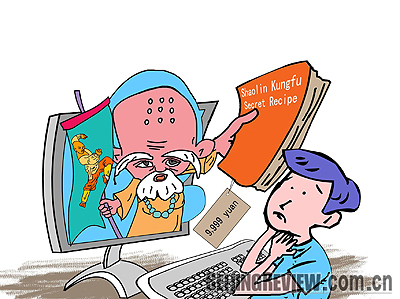|

China's famous Shaolin Temple has recently opened a shop on the country's largest online C2C marketplace www.taobao.com, selling a variety of Shaolin-related products. One notable item is the Shaolin Kungfu Secret Recipe costing 9,999 yuan ($1,429).
According to Qian Xiangpeng, who heads up this e-business program, the online shop sells products with Shaolin cultural characteristics. The Secret Recipe, for example, covers the essence of Shaolin martial arts that has been handed down for generations.
Some people think the cyber shop is a great idea. As the temple is situated in Songshan Mountain in central China's Henan Province, it's inaccessible to many, making buying online very convenient. Advocates of the business model believe that an online shop will attract more visitors to the Shaolin Temple. It is, in addition to business, a publicity tool too, they say.
Others, however, argue that over-commercialization of the brand culture of the Shaolin Temple will tarnish its sacred image and selling the ancient secrets is insulting.
In the past few years, the business development efforts of this thousand-year-old temple have been the focus of attention. From kungfu shows abroad to self-developed kungfu-themed TV dramas and video games, and today's Secret Recipe, the brand has gone far down the road of commercialization. Will this practice help to promote the sound development of Shaolin culture or will it damage Shaolin's reputation and future?
Crossing the line
Yi Zijian (www.itbear.com.cn): The Shaolin Temple opened an online shop, in the name of spreading traditional Chinese culture. Why does it choose to do so? Quite possibly, it's because the monks think they are not doing the thing they as monks shouldn't do.
At present, it's unnecessary to claim that it's for the promotion of traditional culture when one actually intends to do business. To turn to traditional culture promotion as an excuse shows that the Shaolin Temple must have realized that it actually has no proper reasons to get involved in business activities.
Even if the temple really means to promote traditional Chinese culture, why does it sell the Secret Recipe so expensively? The price of 9,999 yuan is unaffordable to common people in China, and I believe even wealthy people will hesitate before buying this highly priced book. Is it really for the promotion of Chinese traditional culture?
Besides, if people find the book is not as effective as it claims to be, the Shaolin Temple will be accused of fraud.
Wang Dawei (Global Times): The Shaolin Temple has now become an important window for foreigners to learn about Chinese culture and it is regarded as a symbol of Chinese culture in the Western world.
The problem is that the Shaolin treasure is being over-commercialized and its open exposure in modern society is betraying the very value it depends on for survival.
| 